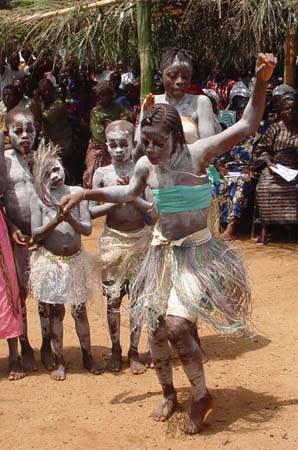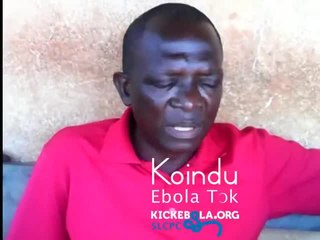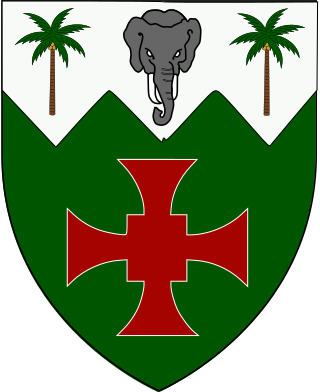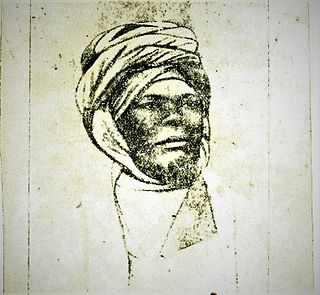
Sierra Leone, officially the Republic of Sierra Leone, is a country on the southwest coast of West Africa. It shares its southeastern border with Liberia, and the northern half of the nation is surrounded by Guinea. Covering a total area of 71,740 km2 (27,699 sq mi), Sierra Leone has a tropical climate, with diverse environments ranging from savanna to rainforests. The country has a population of 7,092,113 as of the 2015 census. Freetown is the capital and largest city. The country is divided into five administrative regions, which are subdivided into 16 districts.

Sierra Leone's music is a mixture of native, French, British, West Indian and Creole musical genres.
Sooliman Ernest Rogers "Rogie", better known as S. E. Rogie, was a highlife and palm wine musician and guitarist from Sierra Leone.

The Sierra Leonean Creole or Krio is an English-based creole language that is lingua franca and de facto national language spoken throughout the West African nation of Sierra Leone. Krio is spoken by 96 percent of the country's population, and it unites the different ethnic groups in the country, especially in their trade and social interaction with each other. Krio is the primary language of communication among Sierra Leoneans at home and abroad, and has also heavily influenced Sierra Leonean English. The language is native to the Sierra Leone Creole people, or Krios, a community of about 104,311 descendants of freed slaves from the West Indies, Canada, United States and the British Empire, and is spoken as a second language by millions of other Sierra Leoneans belonging to the country's indigenous tribes. Krio, along with English, is the official language of Sierra Leone.

Fourah Bay College is a public university in the neighbourhood of Mount Aureol in Freetown, Sierra Leone. Founded on 18 February 1827, it is the first western-style university built in Sub-Saharan Africa and, furthermore, the first university-level institution in Africa. It is a constituent college of the University of Sierra Leone (USL) and was formerly affiliated with Durham University (1876–1967).

Emmerson Amidu Bockarie, better known as Emmerson, is a Sierra Leonean Afropop singer. His music focuses on political topics relating to corruption in the government of Sierra Leone, and he has become well known in his country for lyrics that promote social change. He sings in the Krio and English languages.
Sierra Leoneans in the United Kingdom are citizens or residents of the United Kingdom who are of Sierra Leonean descent. In 2001, there were 17,048 Sierra Leonean-born residents of the UK.
Thomas Alexander Leighton Decker OBE was a Sierra Leonean linguist, poet, and journalist. He is best known for his work on the Krio language and for translating Shakespeare's Julius Caesar into the Krio language. Decker argued forcefully that the Krio language was not merely a patois but a legitimate language. Because Decker argued that Krio was not a patois, his contributions and revisions to the Krio language greatly influenced and added to the revival and appreciation of the language.
Mandingo people of Sierra Leone is a major ethnic group in Sierra Leone and a branch of the Mandinka people of West Africa. Most Sierra Leonean Mandingo are the direct descendants of Mandinka settlers from Guinea, who settled in the north and eastern part of Sierra Leone, beginning in the late 1870s to the 1890s under the rule of prominent Mandinka Muslim cleric Samori Ture. Also later a significantly large population of Mandinka from Guinea migrated and settled in Eastern Sierra Leone and Northern Sierra Leone in the early to mid 20th century. The Mandingo people of Sierra Leone have a very close friendly and allied relationship with their neighbors the Mandingo people of Guinea and Liberia, as they share pretty much identical dialect of the Mandingo language, tradition, culture and food.
Mohamed Saccoh(born in Koidu Town, Sierra Leone), better known by his stage name K-Man, is a Sierra Leonean rapper and one of the most famous musicians from Sierra Leone. K-Man is known for his soft rap tone. He rapped mainly in English and the Krio language as well as occasionally in the Madinka language.
Sierra Leonean Americans are an ethnic group of Americans of full or partial Sierra Leonean ancestry. This includes Sierra Leone Creoles whose ancestors were African American Black Loyalists freed after fighting on the side of the British during the American Revolutionary War. Some African Americans trace their roots to indigenous enslaved Sierra Leoneans exported to the United States between the 18th and early 19th century. In particular, the Gullah people of partial Sierra Leonean ancestry, fled their owners and settled in parts of South Carolina, Georgia, and the Sea Islands, where they still retain their cultural heritage. The first wave of Sierra Leoneans to the United States, after the slavery period, was after the Sierra Leone Civil War in the 1990s and early 2000s. According to the American Community Survey, there are 34,161 Sierra Leonean immigrants living in the United States.

Sierra Leone is officially a secular state, although Islam and Christianity are the two main and dominant religions in the country. The constitution of Sierra Leone provides for freedom of religion and the Sierra Leone Government generally protects it. The Sierra Leone Government is constitutionally forbidden from establishing a state religion, though Muslim and Christian prayers are usually held in the country at the beginning of major political occasions, including presidential inauguration.

Constance Cummings-John was a Sierra Leonean educationist and politician. She was the first woman in Africa to join a municipal council and in 1966 became the first woman to serve as mayor of Freetown, Sierra Leone. She was based in London, England, for the latter part of her life.
Hannah Benka-Coker,, néeLuke was an educator from Sierra Leone. She is one of the founders of the Freetown Secondary School for Girls (FSSG) which was established in 1926.

Macormack Charles Farrell Easmon, OBE, popularly known as M. C. F. Easmon or "Charlie", was a Sierra Leone Creole born in Accra in the Gold Coast, where his father John Farrell Easmon, a prominent Creole medical doctor, was working at the time. He belonged to the notable Easmon family of Sierra Leone, a Creole family of African-American descent.

The Sierra Leone Creole people are an ethnic group of Sierra Leone. The Sierra Leone Creole people are descendants of freed African-American, Afro-Caribbean, and Liberated African slaves who settled in the Western Area of Sierra Leone between 1787 and about 1885. The colony was established by the British, supported by abolitionists, under the Sierra Leone Company as a place for freedmen. The settlers called their new settlement Freetown. Today, the Sierra Leone Creoles are 1.2 percent of the population of Sierra Leone.

The Oku people or the Aku Marabout or Aku Mohammedans are an ethnic group in Sierra Leone and the Gambia, primarily the descendants of marabout, liberated Yoruba people who were released from slave ships and resettled in Sierra Leone as Liberated Africans or came as settlers in the mid-19th century.
Jimmy B, born Jimmy Bangura, is a Sierra Leonean musician, filmmaker, producer and entertainer. He has been called the "Godfather of Sierra Leone music".









